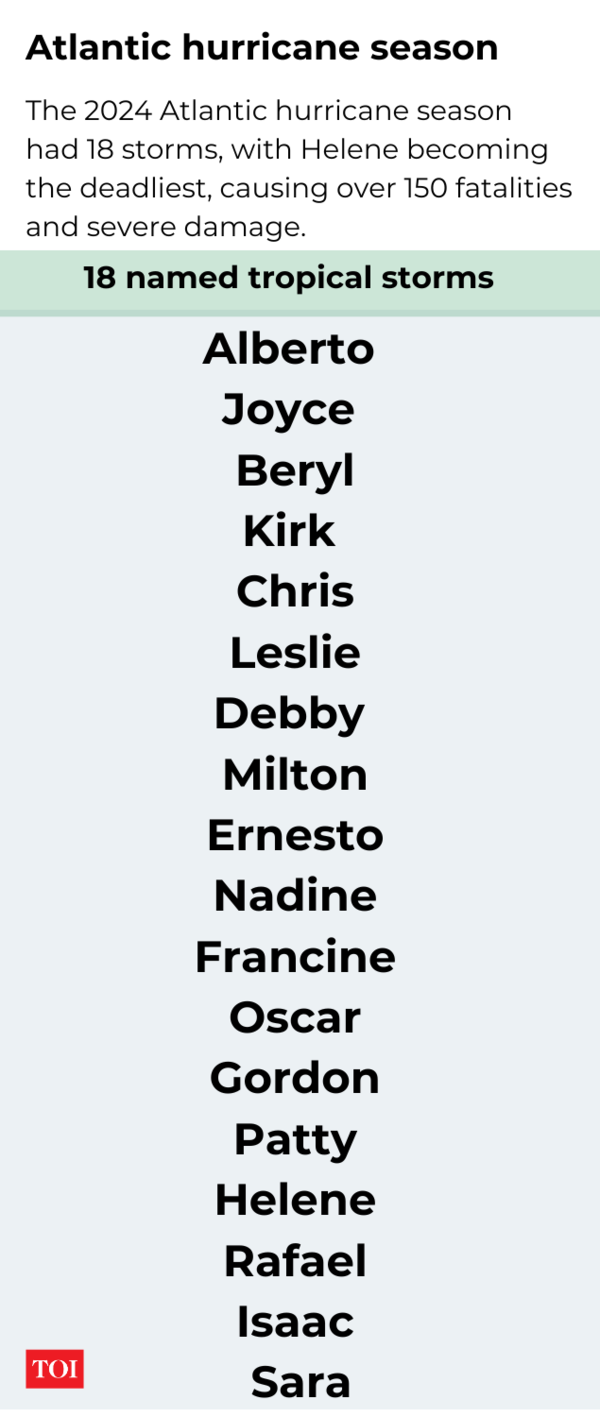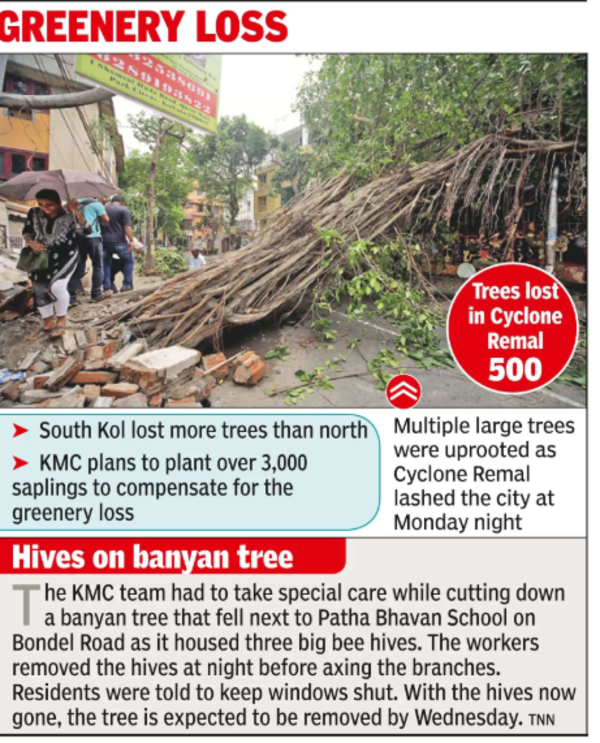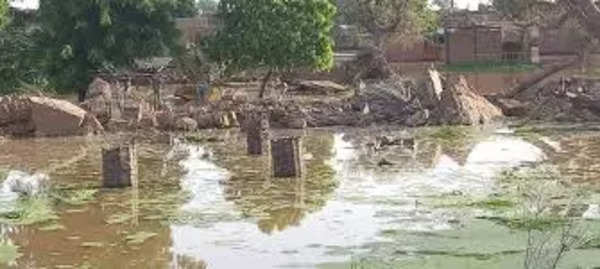
NEW DELHI: The year 2024 is coming to an end, but the extreme weather conditions that have led to the world witnessing nature’s fury in almost every part are far from ending any time soon.
Like the last few years, in 2024, the world witnessed several instances of extreme climate change, with soaring temperatures, wildfires, and severe droughts in areas such as Southern Europe, North America, and some parts of Australia.
The coastal cities are under increased risk where their lands will be submerged and devastated by storms, making it difficult for people in low-lying areas such as the Pacific Islands and Southeast Asia to cope with flooding and dislocation. Also, in India, we witnessed several red alerts by weather departments for cyclonic storms.
The erratic rainfall patterns and extreme weather conditions also impacted the agriculture sector and the food production along with the farmers.
Here’s a look at some climate-related milestones that occurred during 2024.
Hottest year on record
July 2024 marked the hottest month ever with an all-time highest temperature recorded worldwide. Well, here was yet another stark reminder of how anthropogenic greenhouse gas emissions are increasing the effect of climate change.
As reported by Nasa, the hottest day in the whole of history was recorded on July 22. July 21 and July 23 of this year also got above the previous daily record. Unfortunately, this daily record had been set in July 2023.
The European Union’s Copernicus Climate Change Service also reported that July 2024 was the second warmest month globally, following July 2023 by just 0.04°C. Given the tiny differences between datasets, these variations fall within the statistical margin of error used to calculate global temperatures. The World Meteorological Organization (WMO) combines data from six international sources, including ERA5 and NOAA’s GlobalTemp, for its climate assessments.
Wildfires in Canada & Western US
In the year 2024, wildfires were reported both in Canada and the USA. Reports from the Canadian Interagency Forest Fire Centre National Fire Summary indicated that in 2024, there were 5,686 fires recorded across the country with a total area of 5,378,075 hectares (ha).
The previous year’s record from CIFFC (5,475 fires; 17,347,637 ha) and the 10-year average (5,736 fires; 3,512,889 ha) were compared with respect to the total number of fires and area burnt, Canadian National Fire Database (CNFDB) said.
According to the National Area Burned Composite (NBAC) database, concerning the area burned, this year is working toward being the fourth highest record, previously recorded in 1994 (5,042,102 ha). This is subject to change as fire management agencies continue to map and update the calculations for areas burned. Meanwhile, the United States had a massive 51,758 fires burning a total of 8,135,876 acres, according to the National Interagency Fire Center (NIFC).
Atlantic hurricane season
The 2024 Atlantic hurricane season is coming to an end and it has been an active one overall. There have been 18 named tropical storms, with 11 of those reaching hurricane strength and five becoming major hurricanes – category three and above. The list is: Alberto, Joyce, Beryl, Kirk, Chris, Leslie, Debby, Milton, Ernesto, Nadine, Francine, Oscar, Gordon, Patty, Helene, Rafael, Isaac, and Sara.

Of all the hurricanes in 2024, the most impressive in attaining Category 4 storm status was Hurricane Helene, which struck in September and brought severe flooding and wind damage across the Southeast US, ultimately causing more than 150 fatalities-the deadliest figure since Hurricane Katrina.
Hurricane Milton was indeed one such. Milton formed in the Gulf in early October. Milton entered the record books with a staggering wind increase of 90 mph (145 km/h) within 24 hours, one of the most extreme instances of rapid intensification ever recorded.
Milton achieved Category 5 status only for a brief period before dropping to Category 3 hurricane intensity and making landfall on Florida’s western shore. The destruction it wrought was extensive, including a violent storm surge that spawned 46 tornadoes.
Milton was one of a total of seven hurricanes that formed in the Atlantic after September 25, thus establishing a new record for the number of hurricanes to form during that interval.
The final storm of the season was Tropical Storm Sara. Although it did not strengthen into a hurricane, Sara became a slow-moving system near Central America, causing severe flooding. The northern coast of Honduras received more than 3 feet (nearly 1 meter) of rain.
Typhoon impacts Southeast Asian nations
This year, the Southeast Asian nations witnessed an ugly face of climatic conditions when the typhoon hit the land and created havoc for all the citizens.
One of the scariest typhoons Yagi encountered till September 2024 and was the second most powerful globally after Hurricane Beryl (Atlantic Ocean). It has caused severe damage across Southeast Asia, affecting the Philippines, China, Laos, Myanmar, Thailand, and particularly Vietnam.
Another one was Typhoon Shansha which hit Japan, bringing heavy rains and strong winds. Meanwhile, typhoon Bebinca, which made a fall in Shanghai, has top wind speeds of 151 kph (94 mph) near its eye and reached category 1 storm on the Saffir-Simpson Hurricane Wind Scale.
Cyclones impacting civilians across continents
2024 is ending soon but not the cyclone as Cyclone Chido hit France’s Mayotte at the end of this year. Like this, several other cyclones hit different countries including India.
Cyclones are caused by atmospheric disturbances around a low-pressure area distinguished by swift and often destructive air circulation. Cyclones are usually accompanied by violent storms and bad weather. The air circulates inward in an anticlockwise direction in the Northern hemisphere and clockwise in the Southern hemisphere.
The most severe cyclone to land in India in the past 12 months was Remal. With a wind speed of up to 100 km/h, it hit the coast on May 26, 2024 near Kultali and was 103 kilometers in diameter at the time.

According to the internationally accepted Saffir-Simpson classification, this corresponds to a tropical storm cyclone.
Other cyclones that hit India were Cyclone Asna, Dana, and Fengal.
Floods: From Nigeria to Afghanistan
Another impact of climatic change is floods and this is not an unheard phenomenon. Afghanistan is one of the countries that has been the victim of the floods. According to the UNICEF report of June 2024, the floods claimed nearly 350 lives – including at least a dozen children. Over 7,800 homes were damaged or destroyed and over 5,000 families have been displaced.
Another country is the Sahel, a West African country, which has an abnormally active monsoon that brought major flooding to many parts of the Sahel, including Chad, Mali, Niger and Nigeria.
In Mali, 113,619 ha of cropland flooded. In Nigeria, 204,803 ha were affected. Chad ≈ 1 million displaced & 40,000 refugees affected. Mali ≈ 26,000 displaced. Nigeria ≈ 366,000 displaced and Cameroon ≈ 50,000 refugees affected.

Another is Europe, where the extreme rainfall impacted a large area of the central country in mid-September. Five-day rainfall totals exceeding 400 mm occurred in northern Austria, eastern Czechia, and southwestern Poland, far above previous records at many locations. In Spain, more than 150 casualties were reported as a result of flash flooding.
Persistent heavy rainfall in Rio Grande do Sul state of southern Brazil resulted in flooding which inundated large parts of the city of Porto Alegre and many surrounding areas. Economic losses of several billion US dollars were reported.
Landslides in Wayanad and severe floods in Assam have caused extensive destruction, displacing thousands of residents. In Wayanad, heavy rainfall triggered landslides, while Assam faced overflowing rivers, leading to widespread damage, loss of life, and disruption of essential services.
Climate change’s economic burden keeps piling up in 2024, and nations are busy tussling with the financial weight of recovery and adaptation.
Development nations have always faced problems of poverty and ugly political life; it is just that with climate change impacts, it is much more complicated to achieve developmental goals. The pressure on the world’s healthcare systems is increasing, with heat-related illnesses and diseases such as malaria taking on a waterborne or vector-borne character as climate zones shift.
For the first time, in 1992, the world came up with a treaty to take steps toward climate change, which is the United Nations Framework Convention on Climate Change (UNFCCC). It was the first international treaty to limit greenhouse gas emissions and prevent climate change, came into force in 1994, and was ratified by 197 countries. And fighting still to find a better solution. In the last more than 30 years, the world adopted several ways to save the same environment, but now, because of the fast pace of development, the requirement of dozens of new technologies, and rising populations, it is turning forests into habitat space that considerably restricts the success of treaties.
There is, however, an urgent call for the international community to work together to take immediate action on climate: if humans are really to mitigate these disastrous effects, they will have to hurry into reducing carbon emissions, switching to renewable energy, and implementing adaptive measures that will preserve both people and the planet for many decades to come.





